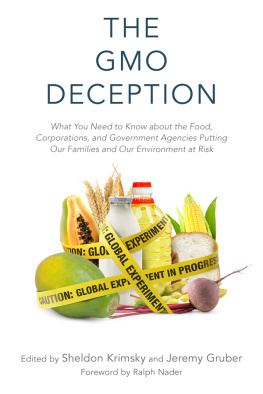Also edited by Sheldon Krimsky and Jeremy Gruber:
Biotechnology in Our Lives
Genetic Explanations: Sense and Nonsense
This book is dedicated to members of the Council for Responsible Genetics Board of Directors and Advisory Board who are no longer with us, but whose work and vision continue to inspire new generations of social and environmental justice activists: David Brower, Barry Commoner, Marc Lappe, Anthony Mazzocchi, Albert Meyerhoff, Bernard Rapoport, George Wald, and William Winpisinger.
Copyright 2014 by Sheldon Krimsky and Jeremy Gruber
All rights reserved. No part of this book may be reproduced in any manner without the express written consent of the publisher, except in the case of brief excerpts in critical reviews or articles. All inquiries should be addressed to Skyhorse Publishing, 307 West 36th Street, 11th Floor, New York, NY 10018.
Skyhorse Publishing books may be purchased in bulk at special discounts for sales promotion, corporate gifts, fund-raising, or educational purposes. Special editions can also be created to specifications. For details, contact the Special Sales Department, Skyhorse Publishing, 307 West 36th Street, 11th Floor, New York, NY 10018 or .
Skyhorse and Skyhorse Publishing are registered trademarks of Skyhorse Publishing, Inc., a Delaware corporation.
Visit our website at www.skyhorsepublishing.com.
10 9 8 7 6 5 4 3 2 1
Library of Congress Cataloging-in-Publication Data is available on file.
ISBN: 978-1-62873-660-1
Ebook ISBN: 978-1-62914-020-9
Printed in the United States
CONTENTS
ACKNOWLEDGMENTS
W e are grateful for the public interest commitment and superb work of GeneWatch editors and editorial boards past and present: Sam Anderson, Philip Bereano, Kostia Bergman, Phil Brown, Sujatha Bvravan, Nancy Connell, Donna Cremans, Christopher Edwards, Leslie Fraser, Phyllis Freeman, Judith Glaubman, Terri Goldberg, Barbara Goldoftas, Colin Gracey, Susan Gracey, Daniel Grossman, Jeremy Gruber, Ruth Hubbard, Kit Johnson, Brandon Keim, Sophia Kolehmainen, Sheldon Krimsky, Herbert Lass, Evan Lerner, Gary Marchant, Wendy McGoodwin, Shelley Minden, Eva Ng, Rayna Rapp, Barbara Rosenberg, Peter Shorett, Seth Shulman, Christine Skwiot, Martin Teitel, Suzanne C. Theberge, Jonathan B. Tucker, Shawna Vogel, Nachama Wilker, Kimberly Wilson, and SusanWright.
Special thanks to Hector Carosso, for his consultation on the title.
We would like to thank Holly Rubino, senior editor for Skyhorse Publishing, who provided editorial guidance that helped the editors clarify the books goals and audience.
We also wish to acknowledge the substantial support of both the Cornerstone Campaign and the Safety Systems Foundation.
FOREWORD
S cience is science, declared my college biology professor, alluding to its own rigorous standards, openness, and integrity. Today, my response would be not quite. For in the autocratic, commercially driven hands of multinational corporations, science becomes the instrument of an overall business plan that results in serious corruptions of scientific attitude, method, and peer-reviewed accountability. This confidential, proprietary corporate science closes off Alfred North Whiteheads definition of science as keeping options open for revision. It becomes, in this books context, the central chattel in a comprehensive business strategy to corporatize global agriculture. This is accomplished through a remarkable matrix of controls and public subsidies that takes monopolizing corporate behavior and its wildcat offshoots to historically unforeseen depths of danger to people and planet.
To better absorb the significance of this wide-ranging anthology of articles by independent scientists and science writers, a brief summary of the biotechnology industrys emergence over time is in order.
Two events from the public realm were crucial initiators. In 1972, came the publication of scientific papers by Cohen & Boyer and associates of transgenic DNA splicing across phylogenetic species, including bacteria, viruses, and insects. The second event in 1980 was a US Supreme Court 54 decision allowing patents on life forms. Those two assets facilitated the start of a broadly conceived strategic planning process for genetically modified (GM) food by the fledging biotechnology industry led by Monsanto.
Corporations engage in strategic planning as the essence of their quest for more revenue and profits. More globalized than ever, they are continually expanding such planning to include, in their favor, our elections, government, environment, education, media, research and development, energy, tax and credit systems, trade agreements, transport, land use, food, and our genetic inheritance. They equate their planning with exercising the control and predictability necessary for their definition of stability. They do not always get their way, but no other institutions have been their match for more than half a century. As artificial entities, from the late nineteenth century onwards, courts have given them the status of persons for the purposes of constitutional rights. The world has never seen such an ingenious, power-concentrating machine as the modern, global corporation. Ideally, many of them would like to view themselves as both amoral and anational (meaning not domiciled in any particular country).
Their corporate lawyers have constructed a proliferating system of privileges and immunities which must be viewed as a remarkable intellectual achievement, apart from the purposes served. Because these corporate giants plan the subordination of civic values to the supremacy of commercialism, any resistance is to be countered, preempted, undermined, or destroyed.
Let us envision, for example, what Monsanto decided to do, once armed with the twin tools of transgenic capability and patentable life forms, to move toward domination of agricultural sub-economies in the US and around the world.
Monsanto had to create a narrative as to why its GMO patented seeds were needed and superior to traditional seeds in the first place. In a massive, relentless marketing campaign, genetically modified foods were touted as safe, cheaper, higher yielding, more nutritious, requiring lower chemical inputs, and resistant to drought and blight. Because these objectives were shared by federal agencies that funded the basic research, the Monsanto campaign, abetted by an uncritical mass media, made their hope spring eternal.
The prospect of alleviating world hunger through these measures of productivity was irresistible to the media, which tend to report scientific discoveries by establishment promoters who tout potential benefits without mentioning potential drawbacks. Outlets like the New York Times and Science Magazine have been prone to falling for this propaganda year after year. One has only to recall reports on how the starving masses would allegedly be saved by GMO rice (Golden Rice), or GMO cassava, or a GM virus-resistant sweet potato or edible vaccines, followed for years by no such realities in the fields, to see the successes of the biotech industrys deception.
Jonathan Latham, crop geneticist and founder of the Bioscience Resource Project, calls Golden Rice the Emperor of GMOs. He cites food writer Michael Pollan, who called Golden Rice a purely rhetorical technology. engineered foods is that the engineering on the ground has rushed far ahead, both in public relations and in misapplication, of the science that must be its ultimate discipline.












